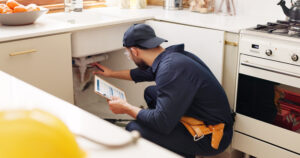
Water is one of the most precious resources we have, and managing its use in your home is essential for both environmental and financial reasons. Excessive water usage can strain your plumbing system, increase your water bills, and even lead to long-term damage. In this blog post, we’ll explore how your water usage impacts your home’s plumbing system and provide practical tips on how to reduce waste, save money, and maintain the efficiency of your plumbing system.
1. How Water Usage Affects Your Plumbing System
Water usage has a direct impact on your plumbing system, affecting both its efficiency and longevity. Excessive use or improper maintenance can cause several issues over time.
Pressure on Pipes and Fixtures:
Constant water flow can lead to wear and tear on your plumbing fixtures and pipes. Over time, this can result in leaks, cracks, or clogs, which may require costly repairs or replacements.
Clogs and Buildup:
Using large amounts of water in a short time can lead to sediment, soap scum, or grease buildup in pipes, causing clogs and blockages. In areas with hard water, mineral buildup can lead to reduced water flow and decreased appliance efficiency.
Higher Water Bills:
The more water you use, the higher your water bills will be. In many homes, inefficient fixtures or leaks contribute to unnecessary water wastage, making monthly utility bills much higher than they need to be.
2. The Benefits of Reducing Water Usage
Reducing water usage not only saves money but also helps extend the life of your plumbing system and makes your home more environmentally friendly. Here are some of the top benefits:
Reduced Utility Bills:
By conserving water, you can lower your monthly water bill. This adds up over time, helping you save money on utilities.
Extended Life of Your Plumbing System:
Using less water means less strain on your plumbing pipes and fixtures. This can prevent damage, corrosion, and wear, extending the life of your plumbing system.
Environmental Impact:
Conserving water reduces your household’s environmental footprint by helping to preserve water resources. Less water usage means less energy used to pump, treat, and distribute water, ultimately reducing your home’s overall environmental impact.
3. Simple Steps to Reduce Water Usage
There are several simple ways you can reduce your home’s water usage without sacrificing comfort or convenience. Here are some effective tips to help conserve water while saving money:
Install Low-Flow Fixtures:
Low-flow faucets, showerheads, and toilets use significantly less water than standard fixtures. Replacing your old faucets with low-flow models can reduce your water usage by as much as 30% without compromising water pressure. Consider also installing water-efficient appliances like washing machines and dishwashers.
Fix Leaks Promptly:
Leaky faucets, running toilets, and dripping pipes are one of the biggest culprits of water wastage in homes. Even a small leak can waste gallons of water over time. Be sure to check for leaks regularly and have them repaired immediately to prevent waste.
Opt for Efficient Watering Systems:
If you have a garden or lawn, watering can be a major source of water wastage. Use a drip irrigation system or soaker hoses, which direct water exactly where it’s needed, minimizing waste. Also, water your plants early in the morning or late in the evening to avoid evaporation during the heat of the day.
Shorten Showers and Reduce Faucet Use:
Taking shorter showers and turning off the faucet while brushing your teeth or washing dishes can make a big difference in your water consumption. Encourage family members to be mindful of water use in their daily routines.
Use a Water Softener:
If you live in an area with hard water, installing a water softener can help protect your plumbing system from mineral buildup. Hard water can cause scale to build up in pipes and appliances, reducing water flow and efficiency. A water softener will prevent this, helping maintain optimal water flow and appliance performance.
4. Why Regular Plumbing Maintenance Matters
In addition to reducing water usage, regular plumbing maintenance is essential for ensuring your system operates efficiently. Plumbing maintenance includes tasks like cleaning drains, inspecting pipes for leaks or signs of wear, and ensuring that your water heater is functioning properly.
What to Do:
- Schedule Regular Inspections: Have a professional plumber inspect your system annually to catch minor issues before they become major problems.
- Hydrojetting: For homes with frequent clogs or slow drains, hydrojetting can be an effective way to clear away buildup and improve water flow in pipes.
- Water Heater Maintenance: Flushing your water heater regularly can help maintain its efficiency and prevent sediment buildup that reduces heating performance.
Save Water, Save Money, and Protect Your Plumbing
Reducing water usage not only saves money but also helps protect your plumbing system and contributes to a more sustainable future. By taking simple steps like installing low-flow fixtures, fixing leaks, and scheduling regular plumbing maintenance, you can ensure that your home’s plumbing system runs efficiently, saving you both time and money in the long run.
If you’re looking for plumbing solutions to reduce water usage or need a professional plumber to inspect your system, call Top Tier Plumbing and Rooter at (951) 475-6521 today. Our experts are here to provide advice, maintenance, and repair services to help you conserve water and keep your plumbing system in top shape.

